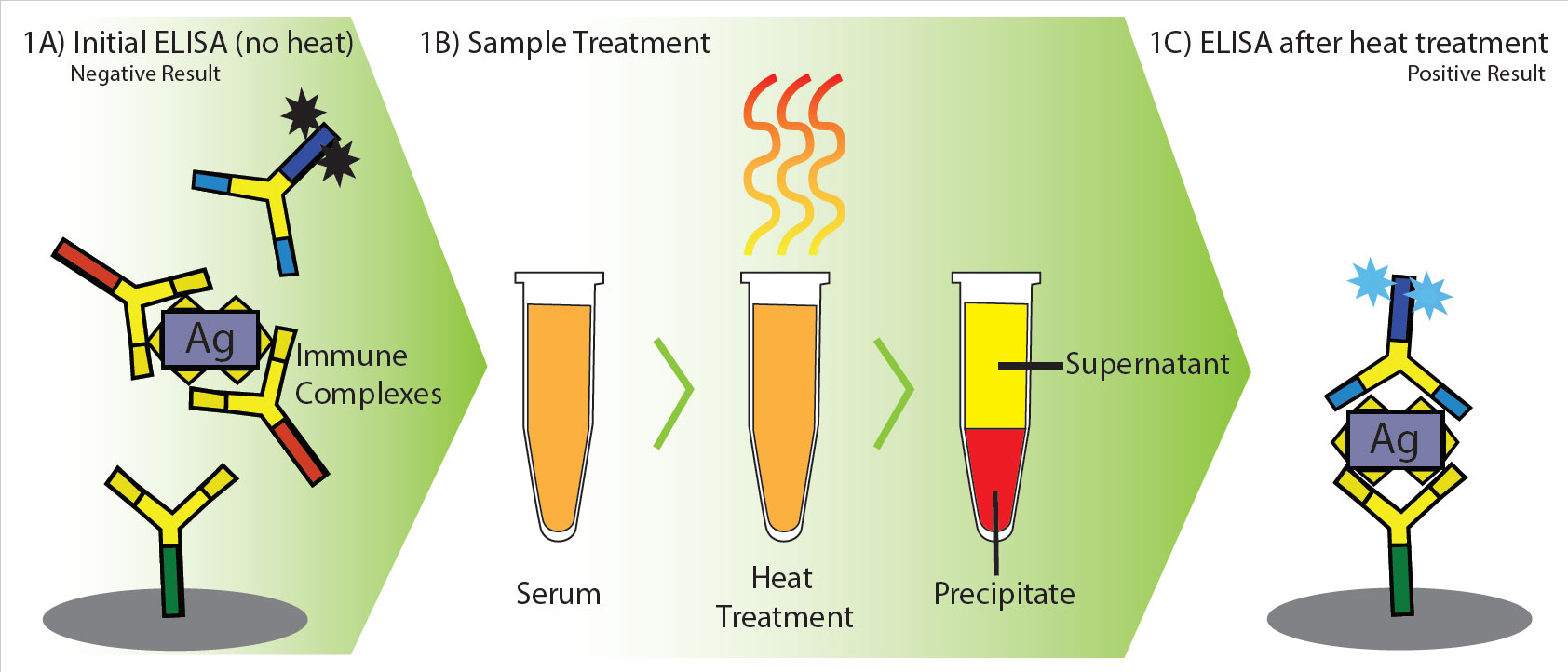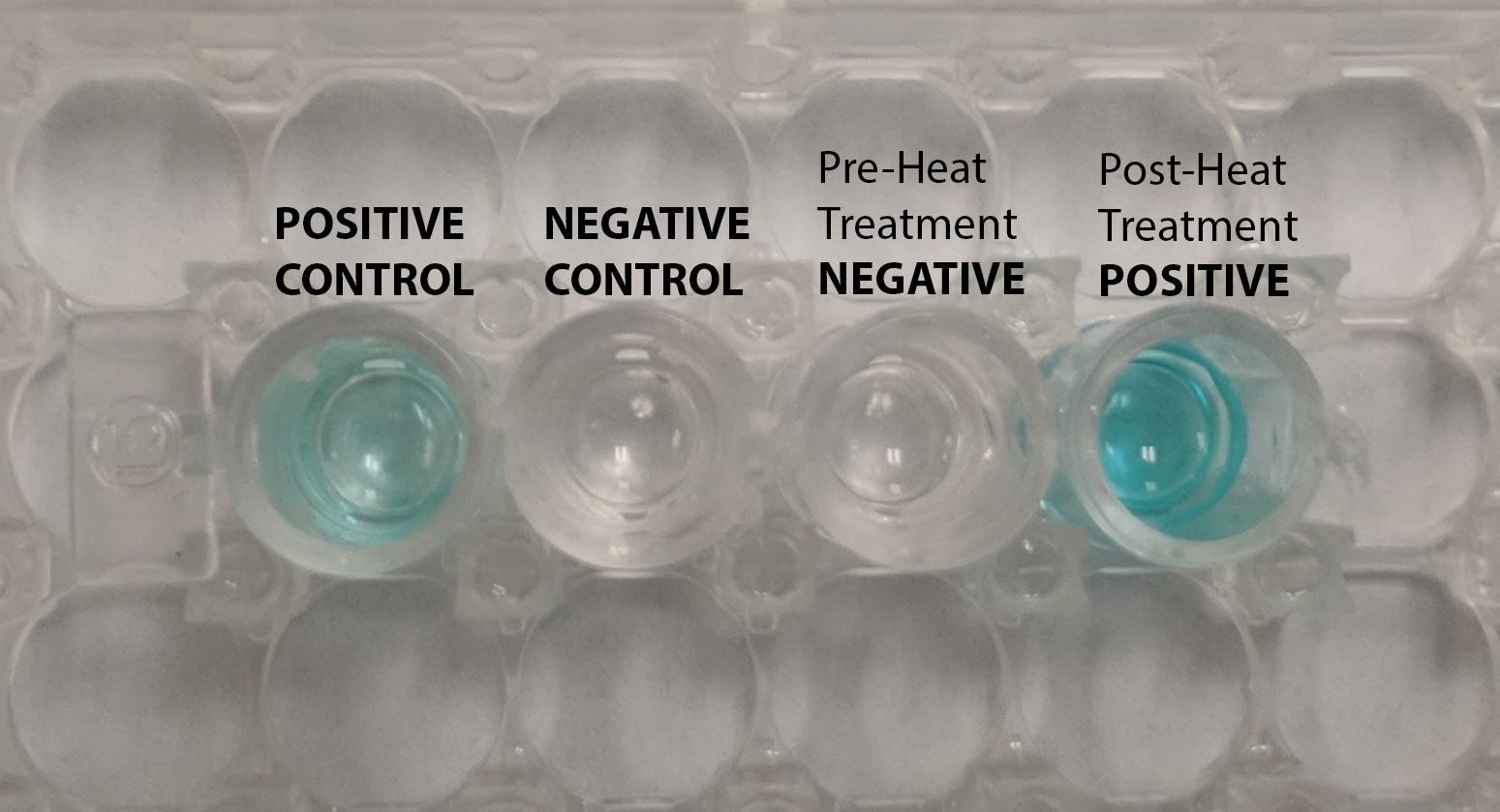
January 2018
Antigen Blocking and Heartworm Heat Treatment Antigen ELISA
By Dr. Brian Herrin
What can we do about it?
After looking through the literature, researchers found that the first heartworm antigen kits came with an antibody dissociation step, which was removed in the newer test platforms1. This step used an acid to break up the antibody, releasing the antigen to be detected by the kit2 (FIGURE 1-C; FIGURE 2). We now know this can be done with a heat step as well (FIGURE 1-B), and many labs, including KSVDL, now offer this test as a supportive diagnostic in working up animals with clinical signs consistent with heartworm disease.
Currently the American Heartworm Society (AHS), Companion Animal Parasite Council (CAPC), and veterinary diagnostic labs DO NOT promote the use of a heat treatment step for every patient. In fact, degrading the antibodies would invalidate kits that detect antibodies to tick-borne diseases or other agents. Instead, veterinarians can submit at least 1 mL of serum to KSVDL and request the "Heartworm Heat Treatment Antigen ELISA."
Who does this affect?
Since the exact cause is not known, veterinarians are unable to predict which animals may experience this Ag-Ab complexing, but it clearly involves an immune response and therefore patients with inflammatory conditions may be more likely to develop blocking antibodies. The current literature has described several common scenarios where antigen blocking may be routinely seen. After heat-treating negative heartworm antigen samples, approximately 5-10% of shelter dogs3 and 6-8% of shelter and feral cats4 reversed to a true positive test result. While these animals do not represent well-cared-for pets, which have a much lower incidence of this phenomenon, they are often adopted out to owners who may rightly believe they have a heartworm negative animal. In addition, 54% of dogs5 who are put on the "slow-kill" heartworm treatment had the same reversal to a positive test result. This may lead veterinarians to believe the "slow-kill" method is more effective or rapid than it actually is, which is why the AHS still does not recommend this as a true treatment option.
Take-home points
- This can happen with ANY heartworm antigen test kit, regardless of manufacturer
- Sample heating should not be performed in general practices at this time
- Occurs more frequently in animals with no or sporadic history of heartworm preventive
- Serum heat-treatment should only be performed for animals with a clinical history and signs supportive of heartworm disease in the face of a negative antigen test
- A minimum of 1 mL of serum is needed to run the test
If you have any challenging heartworm cases or questions about when to request the "Heartworm Heat Treatment Antigen ELISA" please contact Dr. Brian Herrin at the KSVDL (785-532-4430) or KSVDL Client Care (785-512-5650).
References
- Little SE, et al., Pre-treatment with heat facilitates detection of antigen of Dirofilaria immitis in canine samples. Vet Parasit. 2014;203:250-252.
- Beall MJ, et al. Validation of immune complex dissociation methods for use with heartworm antigen tests. Parasit Vector. 2017;10(Suppl 2):481.
- Velasquez L, et al. Increased prevalence of Dirofilaria immitis antigen in canine samples after heat treatment. Vet Parasitol. 2014;206(1-2):67-70.
- Gruntmeir JM, et al. Increased detection of Dirofilaria immitis antigen in cats after heat pretreatment of samples. J Feline Med Surg. 2017;19(10):1013-1016.
- Drake J, et al., False negative antigen tests in dogs infected with heartworm and placed on macrocyclic lactone preventives. 2015;8:68.
Vitamin A and E shortage and the potential impact on cow-calf herds
Return to Index

